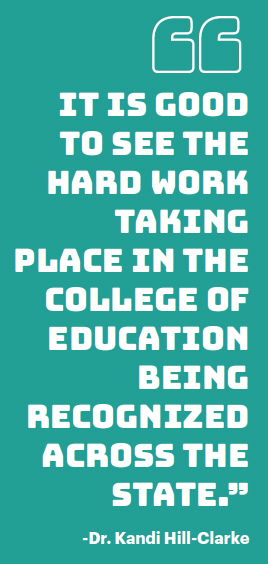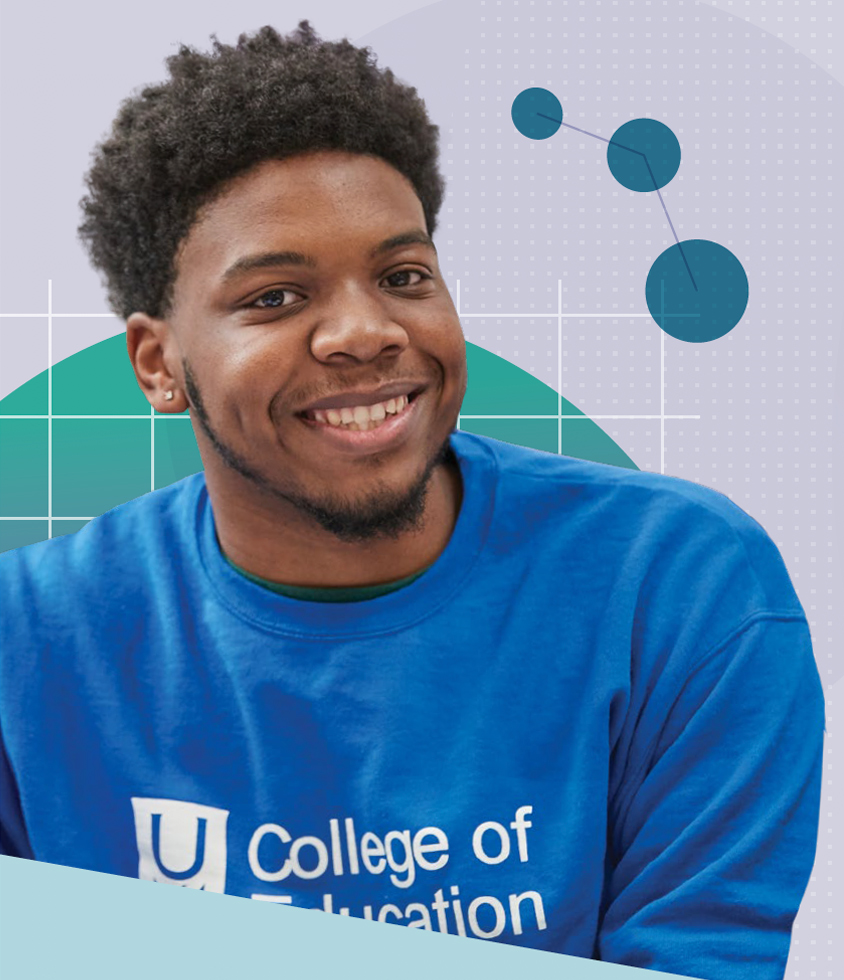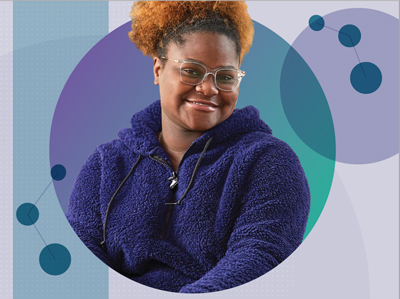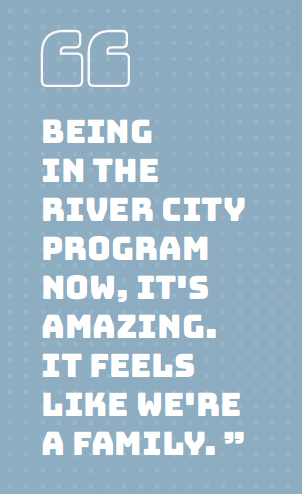UofM Magazine
. . .. . .. . .
By Trent Shadid
The UofM’s College of Education is striving to meet the challenges across the country in recruiting and retaining future teachers.
Dr. Kandi Hill-Clarke took over as dean of the University of Memphis’ College of Education in January 2017. Since that time, Hill-Clarke and her leadership team have implemented and executed a plan that has been undeniably successful.
First and foremost, a concerted effort was put in motion to change the narrative locally around teaching as a profession. Recruitment specialists were hired to help spread a positive message about the college and identify future teachers. Improvements to the preparation plan for current students were put in place to encourage retention and completion.
These enhancements have been made during a time in which recruiting and retaining the next generation of teachers has become a nationwide struggle. As of 2018, teacher preparation programs had experienced an eight-year enrollment decline of more than one-third, according to the Center for American Progress.
The University of Memphis was no exception to this dilemma. By the end of 2016, enrollment in the UofM’s College of Education had declined by almost 50% over the previous four years with enthusiasm waning around the profession.
The improvements made by Hill-Clarke and her team have spawned the beginning stages of reversing the trend locally. The early results speak for themselves.
Why teach? That’s a challenging question, but it’s where the College of Education
starts in its effort to change the narrative around the profession.
“Many of our students are discouraged from teaching,” said Hill-Clarke. “However, in the College of Education, we are tapping into young people’s social consciousness around giving back and contributing in their community.”
It’s about focusing on “why” rather than letting “why not” dominate the overall conversation.
“We’re looking at those who are interested in becoming agents of change,” said Dr. Alfred Hall, College of Education assistant dean. “We want those who want to be excellent in the classroom and are also passionate about making a difference in their community … in our community.”
The search for future change-makers has become a University-wide effort with several departments and colleges helping to identify teacher candidates. Shelby County Schools, the Achievement School District and local charters are also heavily involved through partnerships with the College of Education.
“The preparation of teachers is a collaborative effort that requires the support and engagement of all our on-campus, district and community partners,” said Hill-Clarke.
 In regard to students already in the College of Education Teacher Preparation Program,
there has been an extensive focus on making progress in removing barriers to student
success and improving student results. Leaders of the college regularly review and
adjust programs based on data to better assist students with completion of a degree.
In regard to students already in the College of Education Teacher Preparation Program,
there has been an extensive focus on making progress in removing barriers to student
success and improving student results. Leaders of the college regularly review and
adjust programs based on data to better assist students with completion of a degree.
Mitigating costs plays a major role in removing barriers to completion. Education students can generally expect to spend $700- 1,000 on PRAXIS testing — a mandatory national exam required to earn a degree. Providing effective pre-test preparation has helped reduce the burden of these testing expenses as UofM students are increasingly more likely to pass on their first attempt.
 The UofM teacher preparation program received an “Exceeds Expectations” grade on the
2019-20 State of Tennessee Educator Preparation Report Card. Among the 39 programs
in the state, the University was one of just nine to receive the distinction.
The UofM teacher preparation program received an “Exceeds Expectations” grade on the
2019-20 State of Tennessee Educator Preparation Report Card. Among the 39 programs
in the state, the University was one of just nine to receive the distinction.
“In the College of Education, we have been taking a more intentional approach to the preparation of teachers with an enhanced focus on meeting the needs of P-12 students,” said Hill-Clarke. “That includes closely analyzing and monitoring our data, aligning our curriculum with state standards, strengthening our relationships with district partners and refining our processes and support to ensure that our candidates are student- and classroom-ready.
“It is good to see the hard work taking place in the College of Education being recognized across the state.”
The strides made in recruitment, teacher preparation and the overall view of teaching
as a profession are not possible without leadership that is noticeably present and
available to students.
There’s a willingness throughout the College of Education to provide students a voice that is not only heard but is also used to help shape the direction of the college.
 “Responsive … that’s our key word that drives all the work we do in the College of
Education,” said Hill-Clarke. “We talk about that in every meeting and every discussion.
How are we being responsive to our community, our partners and, most importantly,
our students?”
“Responsive … that’s our key word that drives all the work we do in the College of
Education,” said Hill-Clarke. “We talk about that in every meeting and every discussion.
How are we being responsive to our community, our partners and, most importantly,
our students?”
The College of Education’s faculty and staff in all departments and offices are dedicated to supporting, guiding and mentoring students — including assisting them with challenges and celebrating accomplishments. As a result, the students are serving as advocates, enhancing their own experience in the college while also boosting recruitment through positive feedback.
“When you show a willingness to listen, the possibilities become limitless,” said Hall. “We’ve changed and implemented several things within our college based on listening to our students as well as our community partners. We feel that willingness to listen is not just important but essential.”
Moving forward, the College of Education is preparing for sustaining, and building upon, its momentum.
“Now that we have an infrastructure in place, it’s about reflecting upon the lessons learned and continuing to steady the ship,” said Hill-Clarke. “Our strategic plan will guide us as we continue to focus on diversity, social justice and equity with a strong emphasis on innovative and action-oriented practices.”

The River City Partnership was formed in 2018 to create positive change on multiple levels within Memphis’ educational community. The program has a clear vision and plan to increase the number of students from Memphis-area high schools who attend the UofM and become educators who will help improve youth development locally.
The program is a collaborative effort involving the College of Education, Shelby County Schools, local charter schools and other colleges within the UofM. It includes a summer bridge program for recruitment, and both undergraduate and graduate students are potentially eligible.
The initial River City Teacher Scholars cohort completed its first academic year at the University in spring 2020. Among the initial group of participants, there are 19 undergraduate students. Here is what two of them had to say about their experience so far:
 Bralyn Horton
Bralyn Horton
Freshman | Memphis
“Education wasn’t my first option until I did the summer bridge program. That really opened my eyes and made me feel like education is too easily overlooked. People steer away from it because of the pay, but it’s about the students and the children you can impact in the future.
I would encourage anyone to try the summer program. It’s really eye-opening. It brings a lot of attention to the cause and why education is important. Whether you pursue education or not, the summer program is still a great experience to have.
Being in the River City program now, it’s amazing. It feels like we’re a family. We’re able to connect and talk to each other. We do things outside of school that help us get to know each other while also focusing on our major.
I would say it’s been even better than I thought it would be. Especially being in my first year, it’s a major adjustment to make. At first, I was scared about going into it just because I didn’t think it would be this engaging. It’s very involved and hands-on, which is great.
Some students, right after high school, they’re basically on their own trying to figure out college. Whether you have support outside of River City Scholars or not, you know you’ll have it within the program. It truly helps you be the best student and person you can be.”
 Daejah McAlpin
Daejah McAlpin
Freshman | Jackson, TN
“When I found out about the River City Scholars program, I saw the potential of a great cohort of people who believe in the same ideals and actually want to make a change in education. That has very obviously held true since I’ve been in it.
I like it because I know if I don’t understand something, at least someone in my cohort does. We have that connection where if we need something, we’re all there for each other.
 Dean Hill-Clarke is very involved with us. She’s not someone who is just sitting in
her office all the time and isn’t accessible to students. She’s visibly advocating
for River City and the College of Education as a whole. They stand by what they say
they’re going to do in order to support us.
Dean Hill-Clarke is very involved with us. She’s not someone who is just sitting in
her office all the time and isn’t accessible to students. She’s visibly advocating
for River City and the College of Education as a whole. They stand by what they say
they’re going to do in order to support us.
It’s a little different being the only one in this River City group not from Memphis. At the same time, I feel blessed to even be a part of it because I had initially thought it was only for Shelby County students. And, to me, I’m not really away from home because this is my home, and it’s exactly where I want to be.
I know I want to make the most of this experience and go teach kindergarten once I’m finished. I’ve felt a connection with kids that age, so I really feel like teaching them is my calling.”
